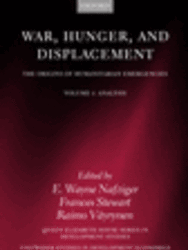Book
War, Hunger, and Displacement
Weak States and Vulnerable Economies : Humanitarian Emergencies in Developing Countries
Since the end of the cold war, the number of civil wars in developing countries has escalated to the point where they are the most significant source of human suffering in the world today. Although there are many political analyses of these emergencies, this two-volume work is the first comprehensive study of the economic, social, and political roots of humanitarian emergencies, identifying early measures to prevent such disasters. Nafziger, Stewart, and Väyrynen draw on a wide range of specialists on the political economy of war and on major conflicts to show the causes of conflict. The first volume provides a general overview of the nature and causes of the emergencies, including economic, political, and environmental factors. The second volume provides detailed case studies of thirteen conflicts (including Rwanda, Burundi, the Congo, Afghanistan, and the Caucasus) that originated in the weakness of the state or where economic factors predominate. The volumes emphasize the significance of protracted economic stagnation and decline, high and increasing inequality, government exclusion of distinct social groups, state failure and predatory rule. They debunk beliefs recurrent in the literature that emergencies are the result of deteriorating environmental conditions, structural adjustment, and deep-seated ethnic animosity. By analysing the causes and prevention of war and humanitarian emergencies in developing countries, this work outlines a less costly alternative to the present strategy of the world community of spending millions of dollars annually to provide mediation, relief, and rehabilitation after the conflict occurs.
 Join the network
Join the network